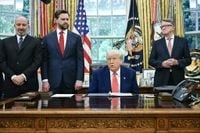On May 8, 2025, President Donald Trump announced a significant trade framework with the United Kingdom, heralding it as a "breakthrough" that U.S. officials hope will pave the way for additional trade agreements aimed at expanding market access for American goods. The announcement, made during a ceremony in the Oval Office, was attended by notable figures including Howard Lutnick, JD Vance, and Peter Mandelson, the British ambassador to the United States.
The trade agreement, while grand in its presentation, has been met with skepticism from economists who caution that the U.K. is not a large enough trading partner for the U.S. to make a substantial impact on the American economy. Beata Caranci, chief economist at TD Economics, remarked, "It’s more symbolic than economic," noting that such initial announcements often serve to fine-tune existing trade relations rather than resolve larger issues.
The framework outlines specific provisions aimed at enhancing trade between the two nations. It will open the British market to American agricultural products, including beef and ethanol, while also allowing British cars and steel to gain better access to U.S. consumers. The U.K. is currently the United States’ fourth largest export market, accounting for just 4.5% of U.S. exports this year.
As part of the agreement, the United States will maintain a 10% duty on nearly all imports from the U.K., a tariff that was imposed on April 2, 2025. This has raised eyebrows among economists who had anticipated that such tariffs would be reduced or eliminated in exchange for trade concessions. Trump indicated that this 10% duty might serve as a baseline for future negotiations with other countries.
In a notable concession, the U.S. will reduce its tariffs on car imports from the U.K. to 10% from the previous 27.5%, but this reduction is limited to only 100,000 cars. Given that the U.K. exported approximately 92,000 cars to the U.S. in 2024, this cap means that the British auto industry will not be able to significantly increase its shipments without incurring higher duties.
Additionally, U.K. steel exports will enter the U.S. duty-free, circumventing the 25% tariff that had been previously imposed. The agreement also establishes a reciprocal arrangement whereby both nations can export 13,000 metric tons of beef to each other's markets. Furthermore, the U.K. has committed to eliminating its tariff on U.S. ethanol imports, allowing up to 1.4 billion liters of ethanol to enter the country without duty.
In a further boost to the aerospace sector, the U.S. will lift all duties on airplane engines and other aerospace components from the U.K.'s Rolls Royce. In return, a U.K. airline is expected to announce a substantial purchase of $10 billion worth of planes from Boeing.
The U.K. will also reduce its average tariff on U.S. goods to 1.8%, translating to an estimated $200 million cut in duties, and lower import taxes on approximately 2,500 U.S. products, including olive oil, wine, and sports equipment. The agreement is projected to create opportunities for an additional $5 billion in new exports of U.S. agricultural and other goods.
However, the deal does not address some significant concerns. Notably, it does not grant U.S. companies any additional access to the U.K.'s government-run National Health Service, nor does it alter the U.K.'s digital services tax, which impacts major U.S. tech companies such as Amazon, Google, and Meta. Trump has been vocally critical of this tax, yet the two nations have agreed to enter negotiations for a digital trade deal.
Moreover, the agreement does not exempt the U.K. from the proposed 100% tariffs on foreign-made films that Trump has suggested. Ongoing negotiations are still required in various sectors, including pharmaceuticals, semiconductors, critical minerals, copper, and lumber, according to a British trade official.
Despite the mixed reactions, U.K. Prime Minister Keir Starmer has expressed optimism about the deal, stating that it would protect thousands of auto jobs and emphasizing the importance of the transatlantic relationship. The British government has underscored that the agreement is a step towards deeper collaboration between the two nations.
As Trump remarked during the announcement, additional details surrounding the agreement will be fleshed out in the coming weeks. This latest trade framework represents a continuation of Trump's strategy to leverage tariffs as a means to negotiate better trade terms, although its actual economic impact remains to be seen.
In summary, while the trade deal with the U.K. is being touted as a significant achievement, the reality of its implications for the U.S. economy and the broader international trade landscape may be more nuanced. As both nations move forward, the focus will likely remain on how effectively they can capitalize on this framework to foster deeper economic ties.


